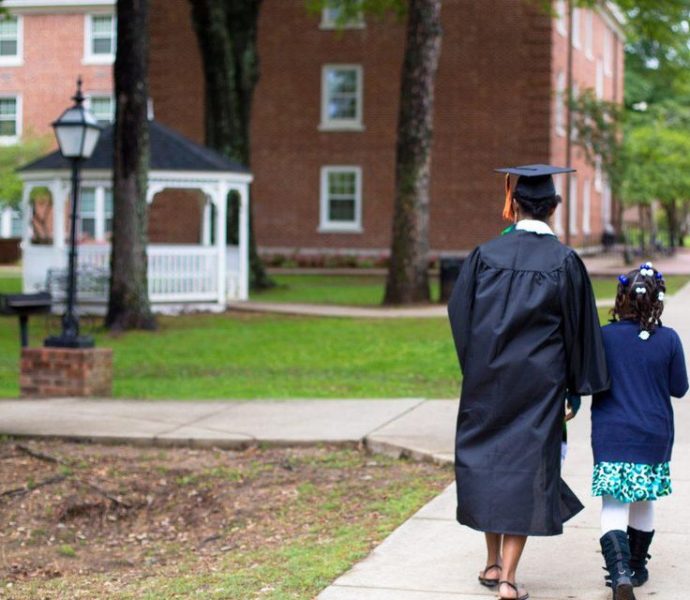A Last-Dollar Investment With A Brighter Future In Return
ByRichard Barth
Read the full article at Forbes.com >
One thousand students. That’s how many young people were dropping out of Georgia State University due to unpaid fees every semester, many leaving college as a result of a shortfall of under $2,000. Tragically, many of these students were seniors, just months away from earning their college degrees. But thanks to some thorough data analysis, Georgia State noticed this troubling pattern six years ago and began its “Panther Retention Grant” program, where qualified students receive “microgrants” (average size: $900) to cover these tuition gaps.
The results prove that these small investments can have a big payoff. Last year, roughly 2,000 Georgia State students received a Panther Retention Grant and 86% of seniors who got these awards either graduated or were able to stay enrolled and continue accruing credits towards a degree.
As I have written in an earlier column, we know that a college diploma can transform the future earning potential and opportunities for students from low-income families. Students who fail to obtain a college degree after taking out student loans face a daunting economic future. Microgrant programs like the one at Georgia State help young people avoid dropping out due to financial hardship.
This idea is spreading to other colleges and universities. About two years ago, UNC Charlotte started offering “Gold Rush Grants” of $1,500 each to students in need. These small infusions of support make a real difference—students who received the grant graduated at an 8% higher rate than eligible students who didn’t.
Two schools in the California State University system have also begun microgrant programs. California Polytechnic State University’s “Cal Poly Cares” grants and California State University, Fresno’s “Good Samaritan Grants” help students in situations of emergency financial need.
At KIPP, the public charter school network I lead, many of our more than 12,000 alumni currently enrolled in college share the same struggles as the students from these colleges. While many of our KIPP alumni qualify for Federal Pell Grants and financial aid to pay for tuition and books, they often face daunting costs for rent, food, transportation and other costs that aren’t always covered by student loans and grants. In fact, nearly 60% of our alumni surveyed in 2016 said they worried that they would run out of food, and 43% said they had missed meals in order to pay for books, fees or other school expenses.
To address these and other barriers to persistence, KIPP schools in Washington DC started piloting their own microgrant program beginning in 2014, funded by the Ludwig Family Foundation. Over the past four years, KIPP DC has offered 39 persistence grants to alumni in college, and 95% are persisting towards their degree or have already graduated. These awards, which average around $3,200, provide critical support, like helping KIPP alumni take summer courses to fill credits and accelerate towards graduation or covering living expenses that can derail a college degree.
Sara is one alumna the KIPP DC Persistence Fund supported. Sara worked throughout her time at the University of Maryland, College Park, not only to contribute to her education but to also help with her family’s household bills. When her mother faced unemployment toward the end of Sara’s college career, Sara, her family, and her KIPP Through College advisor worked tirelessly to find financial solutions to make ends meet. After exhausting all other possible resources, a Persistence Fund award of $1,632 helped her cross the finish line and earn the B.A. degree that she worked so hard to obtain.
Now KIPP is expanding these efforts into a larger national program that will help KIPP alumni across the country. The KIPP National Ludwig College Persistence Fund provides pools of funding that KIPP regions can draw on to offer one-time, emergency grants to students currently in college to prevent them from dropping out or taking semesters off. Next year, KIPP will expand the persistence program to four new communities: Memphis, New York City, Philadelphia and the San Francisco Bay Area. Based on what we’re seeing in DC, we are eager to see the impact at a larger scale.
Interventions like these show that small shifts in resources can have an enormous impact on first-generation college students from low-income backgrounds. Many of these young people take out thousands of dollars in loans and work multiple jobs while pursuing their degrees. A persistence grant of a few thousand dollars can be the difference between a student dropping out and graduating. Microgrants aren’t just transformative for the students who receive them—they also ensure the tax dollars already invested in their education lead to graduation day. Over the coming years, we will be tracking and reporting on the results of the microgrants. Our goal in doing so is to shine a bright light on solutions to barriers that first-generation college goers face as they pursue their careers.
